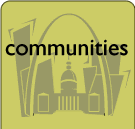| home | our mission | contact us | issue archive |

Jun 2004 / communities :: email this story to a friend

Many Nations, but Not One Map
By Amanda E. DoyleSo far as Beth Radtke can remember, there has never been a fight or even a minor altercation at the International Institute. Considering the mini-world of people who come through its doors every day — representing nations like Vietnam, Somalia, Mozambique, Serbia, Afghanistan, Iran and many more — the peace maintained within its walls is testament to the respect accorded to the Institute by the people who take advantage of its services. While in their home countries, Serbs and Croats might have deep divisions and bloody grudges, Radtke says, "Once they get here and are starting to get their lives back together, it's almost like they just want to put it behind them and move on."
Of course, the no map/no flag policy also helps. Radtke, the International Institute's VP of development and communications, says that not reminding new arrivals of the politicized divisions represented by maps, flags and other symbols helps them to put those tensions in the back of their minds.
Then they can get on with the business that all newcomers have to tackle: challenges like learning English (perhaps becoming literate for the first time in any language), finding a job, securing a place to live and getting their kids in school. It's what the Institute has been helping refugees and immigrants do since 1919 — it's now the largest refugee resettlement agency in the state — and although the nationalities have changed a lot, many of the basics haven't.
"Newcomers want the same things we all want — good schools, decent jobs, a safe place to live," says Radtke. The extra hurdles they have to overcome are substantial, though, and as the source of the stream of arrivals has changed, the needs have changed some, too. Lately, the arrival of many Afghan women with large numbers of children has meant a greater demand on mental health and basic skills services; often, these women stayed home with their children and never learned to read or write, while husbands or male relatives worked, earned money and took care of the details of daily life. As the needs change, so does the Institute, "learning lessons from them at least as often as they do from us!" Radtke admits. For example, the arrival of a large number of Somali Bantu people called for a serious back-to-basics approach: most had never seen a toilet or a light switch, and what might seem obvious to you is, on its face, not that intuitive. Solution? Constructing a mock bathroom, so that staff members could show the Somalis just how everything is supposed to work.
Learning is a constant process at the Institute, which is already full to bursting at its South Grand headquarters, a relatively spacious upgrade from its former location near Cardinal Glennon hospital. Nonstop bustle fills the hallways between English classes (when a bell rings, just like being back in high school), and there's gossip, flirting and people stepping outside for a smoke. Upstairs, counseling and mental health services are provided, and a nonstop procession of a veritable United Nations of toddlers finds the corner play area. The Institute also provides assistance in job training — their Patient Care Assistant training is quite popular — along with small business development, translation services, home visits for intensive help during the first few weeks of arrival, and a range of programs for refugee youth. You start to see why there's barely a room to spare: Beth ended up shepherding me to a staff lunchroom to talk.
The needs are endless, although the funding and the occasional grousing from bitter native-born Americans (think Town Talk or your worst racist neighbor) is not. Conspiracy theories and misinformation abound, leading to wrongheaded rants about immigrants getting fat of supposed government giveaways. Still, Radtke is positively effusive when describing the world of programming happening under one roof — the rewards can be ephemeral, but sometimes, she says, "you even see them smile!" She referred especially to the Afghan women, whose cases are often quite difficult indeed.
You can see them smile for yourself, as well as find out more about the rich diversity of cultures present in St. Louis, at the popular Festival of Nations in Tower Grove Park on July 24 & 25. Music, food, storytelling, food, dance and food are among the attractions. You and 50,000 of your closest friends can think globally, get involved locally and wish the International Institute another 85 years of service. Volunteers are also needed for work with teens, literacy tutoring, organizing collection drives (e.g. for personal care items) and to assist in many ways with the immigrants and refugees; for more information, contact the Institute at 314-773-9090.
Amanda Doyle is from the South, which, in a way, is like another country.
Church and State | Games | Expatriates | Communities | From the Source
It's All Happening | Young Minds | The Ordinary Eye | Elsewhere
Sights and Sounds | Media Shoegaze | A Day's Work | From the Editor
© 2004 The Commonspace
